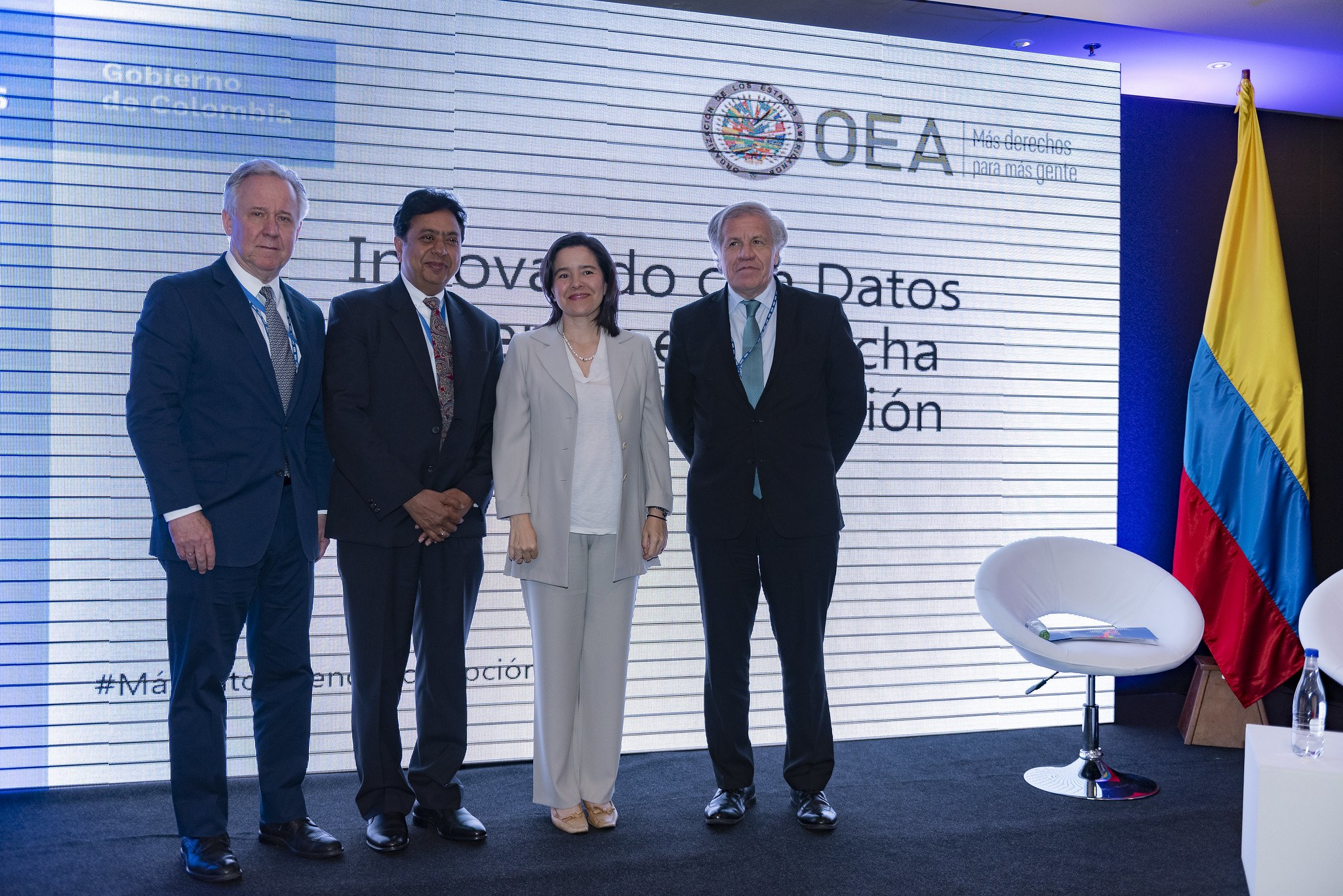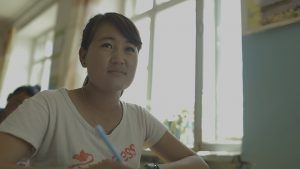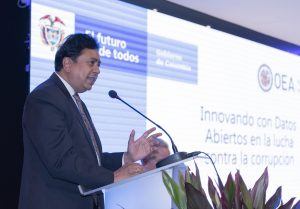Our Collective Imperative: Fighting for Democracy in the Americas
Nuestra obligación colectiva: La lucha por la democracia en las Américas
Based on Sanjay Pradhan's Opening Remarks Delivered at the “Innovating with Open Data to Fight Corruption” Event at the OAS General Assembly
The Americas have been the vibrant heart of OGP from the outset. So it is appropriate that we seek to build strong alliance with the Organization of American States (OAS). In the Americas, 19 countries are members of OGP as well as OAS, and more are eligible to join OGP. We have a collective opportunity and imperative to join forces between OAS, OGP and our member states to strengthen democratic governance, as called for by OAS Heads of States in the Lima Commitment.
Our collective imperative today is more vital than ever because democracy is facing its gravest threat in decades. We are witnessing an unprecedented rise of authoritarian leaders in Hungary, Turkey, Russia, Venezuela and beyond. Leaders eroding checks and balances to consolidate power, attacking journalists and civil society. Equally worrisome, citizen trust in democratic institutions has plummeted to an all-time low. According to the Democracy Perception Index 2018, an astonishing 64 percent of citizens living in democracies believe that their elected government rarely or never acts in the public interest. The Latinobarometer for 2018 finds that 71 percent of citizens are dissatisfied with their democracy.
Against this gloom and doom, the good news is that courageous reformers in government and civil society – in OGP and beyond – are working to reinvigorate democracy between and beyond elections. This is also a key priority for OAS, and the recent approval of the Inter-American Open Data Program to Combat Corruption – PIDA is a clear sign of that. They are empowering citizens to shape and oversee government – every day, not just once every few years when we cast our vote. We call it Democracy Beyond the Ballot Box. Our collective task is scale up these inspirational practices across the region.
 From left to right – James M. Lambert, Sanjay Pradhan, Sylvia Constaín, and Luis Almagro at the 2019 OAS General Assembly in Colombia.
From left to right – James M. Lambert, Sanjay Pradhan, Sylvia Constaín, and Luis Almagro at the 2019 OAS General Assembly in Colombia.
For this, our first collective endeavor must indeed to be advance transparencyAccording to OGP’s Articles of Governance, transparency occurs when “government-held information (including on activities and decisions) is open, comprehensive, timely, freely available to the pub... More and open dataBy opening up data and making it sharable and reusable, governments can enable informed debate, better decision making, and the development of innovative new services. Technical specifications: Polici... for anti-corruption, as our session calls for. But that is only part of the solution. This data needs to be relevant to people’s lives and actionable by them. So, we need to simultaneously mobilize citizen feedback on the use of this data, including by leveraging digital technologies. We need both the supply and demand sides of governance – neither government nor civil society can fight corruption alone.
- For instance in Mexico, through its OGP commitmentOGP commitments are promises for reform co-created by governments and civil society and submitted as part of an action plan. Commitments typically include a description of the problem, concrete action..., the government disclosed data on infrastructure projects on the Budget Transparency Portal. But it then partnered with civil society through its “Taking Data to the Streets” initiative, where citizens visited the projects listed on the portal, reported discrepancies using social media, and tracked remedial action online.
- Italy has also leveraged OGP to disclose data on 1 million projects financed by 100 billion euros of EU funding but then launched a massive public campaign to empower citizens, including high school students through school competitions, to become on-the-ground citizen monitors of projects.
Our second collective endeavor must be to tackle grand corruption.
- In Ukraine, to combat the capture of public procurement contracts by oligarchs, young reformers built online platforms – ProZorro and DoZorro – leveraging OGP, disclosing contracts in open data standards so citizens can search them and importantly, report violations. In two years, citizens reported 14,000 violations with over half publicly resolved, the government saved $1 billion, 82 percent of entrepreneurs report reduced corruption from the use of the platform. Galvanized by such results, 46 OGP governments including 16 from the Americas have committed to open contracts. Colombia has used open contractingA transparent procurement process, known as open contracting, increases competition, improves public service delivery, and ensures governments better value for their money. Technical specifications: C... More to save 10-15 percent in its school feeding program and has just published complete procurement data in open data standards.
- The Panama Papers unmasked rampant stolen assets stashed in anonymous companies. Now 16 OGP countries, such as the UK and Chile, are creating public registers of beneficial owners to show who really owns the companies, allowing journalists and activists to track illicit funds.
Let us join forces to scale these up so they become new regional norms to combat corruption.
But a central precondition for all this is citizen’s basic ability to freely speak, associate, assemble, and the ability of journalists and activists to serve as vital intermediaries and watchdogs for citizens. Without this, democratic governance or open data don’t work. But this civic space is itself under attack in over 100 countries including several countries in the region. So our third collective task is to support our member countries to protect and enhance civic space such as Serbia OGP commitment on the Commission into the Murder of Journalists bringing three cases to justiceTo address barriers that prevent citizens from having their justice needs met, OGP participating governments are working to expand transparency, accountability, and inclusion into all systems of justi..., inspiring Montenegro to take similar actions.
Our final collective imperative is to strengthen our partnership between OAS and OGP to advance our shared goal of strengthening democracy. We can combine OAS’ political diplomacy with OGP’s global network of reformers in government and civil society using country-based platform to translate commitments into concrete actions. For example, 20 OGP countries, including Brazil and Colombia, implemented their 2016 London Anti-Corruption Summit commitments through OGP action plans.
Let us ensure that the precious Lima Commitment – including the The Inter-American Open Data Program to Combat Corruption – PIDA – doesn’t just remain words on a communique or twitter feeds. Let us support governments and civil society to advance their Lima commitments through concrete OGP action plans. In doing so, let us together ordinary people in the region to shape and oversee their government to ensure it serves them rather than itself.
Let us together forge a countervailing force against authoritarianism, and a positive global force that reinvigorates democracy, between and beyond electionsImproving transparency in elections and maintaining the independence of electoral commissions is vital for promoting trust in the electoral system, preventing electoral fraud, and upholding the democr... More.
Las Américas han estado en el corazón de OGP desde el inicio. Por ello, es importante que busquemos establecer una alianza con la Organización de Estados Americanos (OEA). En las Américas, 19 países son miembros de OGP y la OEA y varios más son elegibles para incorporarse a OGP. Tenemos la oportunidad y la obligación de unir fuerzas entre la OEA, OGP y nuestros estados miembros para fortalecer la gobernanza democrática como lo solicitaron los jefes de Estado durante el Compromiso de Lima.
Hoy, nuestra obligación colectiva es más importante que nunca porque nuestra democracia está enfrentando la amenaza más seria en décadas. Estamos siendo testigos del alza de líderes autoritarios en Hungría, Turquía, Rusia, Venezuela y más. Una serie de líderes están debilitando los sistemas de control para consolidar el poder, atacar a los periodistas y a la sociedad civil. Igualmente preocupante es que la confianza en las instituciones democráticas se ha desplomado. Según el Índice de Percepción Democrática de 2018, el 64% de los ciudadanos que viven en regímenes democráticos opinan que los funcionarios de su gobierno rara vez o nunca actúan en el interés del público. El Latinobarómetro de 2018 encontró que el 71% de los ciudadanos están insatisfechos con su democracia.
En este contexto de pesimismo, la buena noticia es que un grupo audaz de reformadores de gobierno y la sociedad civil – tanto en el marco de OGP como fuera de él – están trabajando para fortalecer la democracia entre las elecciones y más allá de ellas. Esto es una prioridad clave para la OEA y la reciente aprobación del Programa Interamericano de Datos Abiertos para Combatir la Corrupción (PIDA) es una señal clara de ello. Dichos reformadores empoderando a los ciudadanos para definir y supervisar al gobierno – todos los días y no solamente cada vez que votamos. A esto lo llamamos Democracia más allá de las urnas electorales. Nuestra tarea colectiva es escalar estas prácticas inspiradoras en toda la región.
 De izquierda a derecha – James M. Lambert, Sanjay Pradhan, Sylvia Constaín, and Luis Almagro en la Asamblea General de la OEA en Colombia.
De izquierda a derecha – James M. Lambert, Sanjay Pradhan, Sylvia Constaín, and Luis Almagro en la Asamblea General de la OEA en Colombia.
Para ello, nuestra primera tarea colectiva debe ser impulsar la transparencia y los datos abiertos para la anticorrupción, como lo exige esta sesión. Pero esto es solamente una parte de la solución. Es necesario asegurar que estos datos sean relevantes y prácticos para las personas. Para ello, necesitamos movilizar la retroalimentación de los ciudadanos sobre el uso de estos datos, entre otras acciones, aprovechando las tecnologías digitales. Necesitamos tanto la oferta como la demanda de la gobernanza, pues ni el gobierno ni la sociedad por sí mismos pueden luchar contra la corrupción.
- Por ejemplo, en México, a través de un compromiso de OGP, el gobierno publicó datos de proyectos de infraestructura en el portal de transparencia presupuestaria. Más adelante, se asoció con la sociedad civil a través de la iniciativa “Llevando los datos a las calles”, a través de la cual los ciudadanos tienen la oportunidad de visitar los proyectos que aparecen en el portal, reportar casos de discrepancias a través de las redes sociales y dar seguimiento a las acciones de corrección en línea.
- Italia también aprovechó el proceso de OGP para publicar datos sobre un millón de proyectos financiados con 100 mil millones de euros de financiamiento de la Unión Europea y después lanzó una campaña masiva para empoderar a los ciudadanos, incluyendo a estudiantes de secundaria a través de competencias escolares para monitorear proyectos en campo.
Nuestra segunda tarea colectiva debe ser abordar la corrupción de gran escala.
- En Ucrania, para combatir la captura de los contratos públicos por parte de la oligarquía, un grupo de reformadores jóvenes estableció plataformas en línea – ProZorro y DoZorro – aprovechando e proceso de OGP, publicando contratos con estándares de datos abiertos de manera que los ciudadanos puedan tener acceso a ellos y reportar posibles violaciones. En dos años, los ciudadanos han reportado 14,000 violaciones y más de la mitad de ellas se han resuelto públicamente, el gobierno ha ahorrado $1 mil millones y el 82% de los empresarios han reportado que la corrupción se ha reducido como resultado del uso de la plataforma. Con base en estos resultados, 46 de los gobiernos de OGP, incluyendo a 16 de las Américas se han comprometido a establecer contratos abiertos. Colombia utilizó el marco de contratación abierta para ahorrar entre el 10 y el 15% en su programa de desayunos escolares y acaba de publicad datos de procuración completos en estándares de datos abiertos.
- Los Panama Papers desenmascararon una enorme cantidad de activos robados a través de empresas anónimas. Hoy, 16 países como el Reino Unido y Chile están creando registros públicos de beneficiarios reales para mostrar a los propietarios de las empresas, lo que ha permitido a periodistas y activistas identificar y dar seguimiento a fondos ilícitos.
Unamos esfuerzos para escalar estas acciones de manera que sean la nueva norma regional para combatir a la corrupción.
Una condición necesaria para ello es que los ciudadanos tengan la capacidad de expresarse, asociarse, reunirse y que los periodistas y activistas puedan ejercer su papel de supervisión. Sin estas condiciones, la gobernanza democrática y los datos abiertos no funcionan. Pero el espacio cívico en sí mismo está siendo amenazado en más de 100 países, algunos de los cuales se encuentran en la región. Nuestra tercera tarea colectiva es apoyar a los países miembros para proteger y fortalecer el espacio cívico, como es el caso del compromiso de Serbia sobre la Comisión sobre el Asesinato de Periodistas que ha logrado hacer justicia en tres casos, lo que además inspiró a Montenegro a llevar a cabo acciones similares.
Nuestra obligación final es fortalecer la alianza entre la OEA y OGP para impulsar la meta común de fortalecer la democracia. Podemos aprovechar la diplomacia política de la OEA y la red global de reformadores de gobierno y la sociedad civil de OGP utilizado la plataforma para traducir los compromisos en acciones concretas. Por ejemplo, 20 países de OGP, incluyendo a Brasil y Colombia, implementaron los compromisos que establecieron durante la Cumbre Anticorrupción de Londres de 2019 a través de los planes de acción de OGP.
Aseguremos que el Compromiso de Lima – incluyendo el Programa de Datos Abiertos para Combatir la Corrupción – PIDA – sea más que palabras. Apoyemos a los gobiernos y a la sociedad civil para impulsar sus compromisos de Lima a través de planes de acción de OGP concretos. En ese proceso, reunamos a las personas de la reunión para definir y supervisar a sus gobiernos para asegurar que realmente trabajen en su interés.
Establezcamos una fuerza en contra del autoritarismo y un movimiento global para fortalecer la democracia entre elecciones y más allá de ellas.
No comments yet
Related Content

Global Report
The promise of democracy is often defined by the ballot box, where citizens determine who will represent their interests in government. That promise, however, too often fails to translate to…
Empowering the People – Our Antidote to Authoritarianism
Remarks made by OGP CEO Sanjay Pradhan at the Opening Plenary of the 2018 Global Summit in Tbilisi, Georgia, on July 18, 2018.
 Impact
Impact
Why Gender, Why Now
Closing gender gaps is imperative to our organization’s growth, success and sustainability, and it is essential that all our fellow citizens - not just half of them! - have the…


Leave a Reply